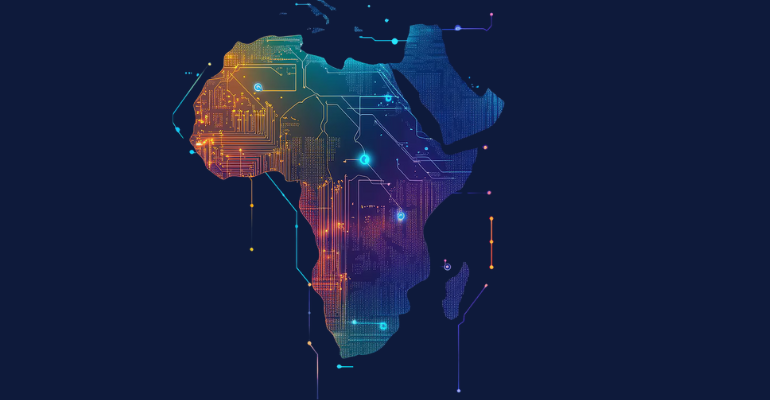Policy Brief
Thematic Area: Digital Transformation, Advanced Technologies, and Cyber Security

Digitalisation Initiatives in the African Union
Introduction
The Internet has become one of the most consequential technologies in human history and has fundamentally realigned the way individuals communicate, trade, and understand the world around them. Technologies enabled by the internet such as blockchain, social media, and artificial intelligence (AI) have greatly improved global productivity and economic flows. Therefore, the development of a robust, modern digital infrastructure is central to any national or regional ambition, to increase their commercial or diplomatic presence in the global environment.
Recognizing the importance of digital technologies and transformation, the African Union (AU) has developed a dedicated strategy titled the Digital Transformation Strategy for Africa 2020-2030. The strategy outlines a coordinated approach for African nations to develop and harmonise their digital ecosystems, while addressing and mitigating negative externalities that may arise in the digital transformation journey. Moreover, it provides key recommendations and pillars for the African Union to structure and guide its digital transformation journey.
Key Takeaways from Digital Transformation Strategy (2022-2030)
In the Digital Transformation Strategy, the AU identifies several foundational pillars to guide digitalisation efforts. The first of these is cultivating a favourable environment for emerging technologies and a robust digital ecosystem, which would be supported through the development of harmonised digital strategies on a continental, national, sectoral, and regional level; integration of eServices, developed by the private and public sectors, within African communities; and strengthening collaborations between African institutions regarding data protection and digitalisation.
Next, as digital infrastructure is a key component of any significant digitalisation initiative, the AU intends to promote national and supra-national interconnectivity and infrastructure sharing, investment into an indigenous and affordable telecom and green ICT (Information and Communications Technologies) infrastructure.
Third, the AU intends to upskill human capital with digital skills through focused initiatives such as endowing African schools with digital infrastructure and technology as well as facilitating the integration and familiarity of digital technologies across all African economies.
Fourth, the AU intends to increase digital innovation and develop an entrepreneurial ecosystem on the African continent through improving accessibility to financing for digital firms, addressing interrelated barriers, and strengthening partnerships amongst African partners.
Moreover, the strategy identifies key areas for the AU to strategically invest and foster digital transformation on the continent. The AU identifies the development of an indigenous digital industry and architecture that would, in turn, facilitate the dispersion and integration of ICT technologies in African society. Digital trade and financial services would also increase the interconnectedness of African economies and promote the uptake and utilisation of e-commerce platforms and services. Further, the AU intends to promote stronger digital governance standards in their digital ecosystem as well as implement digital education initiatives to expand ICT familiarity in early education. Finally, the AU intends to expend greater resources towards digital health to increase accessibility to health services across the continent.
Recent major initiatives to implement digital integration within the Africa Union
Building on the strategies, recommendations, focus areas, and pillars outlined in the Digital Transformation Strategy (2020-2030), the AU has taken several initiatives over the past five years to increase the adoption of digital technologies on the continent and catalyse digital transformation.
One of these initiatives is the African Union Digital and Innovation Fellowship that recently selected 19 young innovators from 10 countries across the African continent in its 2nd cohort this past April. Through the fellowship, facilitated by the African Union Commission’s directorate of Women, Gender, and Youth in partnership with GIZ Office to the African Union and Afrilabs, the innovators would serve in AU Commission Departments and Organs as ‘Resident Fellows’ for a period of 12 months to increase the exposure of these innovators to data management challenges within the AU system. In turn, this experience provides innovators with the opportunity to develop sustainable tailor-made projects, products, and processes to improve the AU’s data and organizational management.
Another initiative started by the AU is the African Union Innovation Lab that aims to support the AU’s goal of ushering the continent into a period of socio-economic growth, sustainable development, and technological advancement. The flagship initiative of the Innovation Lab is the “1 Million Next level” initiative that aims to provide opportunities for 300 million young Africans in areas such as education, entrepreneurship, and engagement. Specifically, the lab aims to provide the resources and infrastructure for young, entrepreneurial Africans to develop indigenous digital solutions on the continent.
Finally, the African Digital Compact (ADC), developed under the aegis of the AU Digital Transformation Strategy, aims to transform Africa into a developed, digitally forward continent. The ADC enumerates strategic objectives to catalyse the continent’s digital transformation journey. These include improving digital access and connectivity, enhancing digital literacy and skills, leveraging digital technologies for sustainable development, implementing cybersecurity strategies to protect digital ecosystems, supporting digital innovation and entrepreneurship, strengthening data protection and privacy, and bridging the global digital gap. Moreover, to support the ADC, the AU has proposed to launch an African Digital Cooperation Forum (ADCF) that would serve as a knowledge broker and investment facilitator for ADC initiatives.
Way Forword
The AU has taken several steps towards cultivating an indigenous digital ecosystem on the African continent. The ADC and AU Digital Transformation Strategy are key roadmaps that identify key priorities and goals for the AU to anchor a comprehensive multilateral digital strategy that is inclusive, sustainable, and secure. Moreover, initiatives such as the AU Digital and Innovation Fellowship and the AU Innovation Lab are facilitating the inception of Africa’s modern digital ecosystem. The AU could build upon these initial initiatives and expand digitalisation efforts through expanded digital skilling workshops and greater investment into digital infrastructure at a municipal level across the continent. Through the AU’s digitalisation initiatives, the continent could not only bridge the digital gap but also become a global leader in the digital plane in the coming years.
